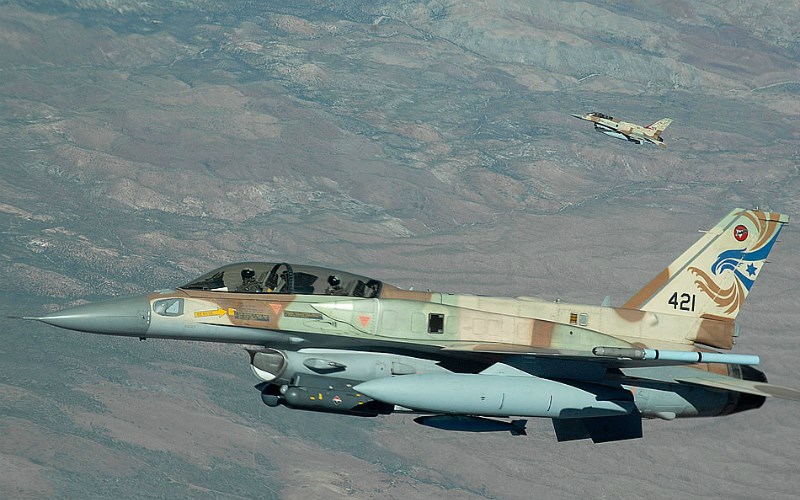"We're trying to get to the bottom of it," Sen. Tom Cotton said on Washington Watch Monday, in reference to the delay.
The administration has delayed the sales of thousands of precision weapons in recent months, The Wall Street Journal* reported Monday. Included in the delay would be MK-82 bombs, fuses and guidance kits designed to increase the accuracy of the munitions. Israel and the U.S. agreed upon the sale of the munitions in February, according to the report.
Cotton pointed out that John Kirby, the White House National Security Communications advisor, dodged a question about the delayed munitions at a Monday press briefing.
"You may have seen John Kirby today hem and haw and refuse to confirm or deny those reports, which leads me to believe they very well may be true. If so, it may be the worst foreign policy blunder yet of this president's failed tenure – even worse than the withdrawal from Afghanistan," Cotton told show host Tony Perkins.
The Hill reported Sunday that the White House faces its own May deadline set in February in which it is to report to Congress whether countries receiving U.S. weapons and munitions are using them consistent with international humanitarian and human rights laws. The administration has authorized over 100 arms sales to Israel during its six-month war with Hamas, according to that report.
The White House continues to use the word "ironclad" to describe its commitment to Israel. Cotton, however, sounded pessimistic about that.
"It's bad enough to try to verbally or rhetorically restrain Israel. It's much worse to deny it the ammunition it needs in the middle of a shooting war for its own survival," argued the senator. "If they are denying Israel with ammunition resupply, they are surely signaling that to Hamas as well, which again just encourages Hamas to dig in and wait out Israel and not release a single hostage."
Cease-fire news was more Hamas antics
Hamas on Monday announced it had accepted a cease-fire deal brokered by Egypt and Qatar; but Israel balked, saying the deal was "far from meeting Israel's core demands," The Associated Press reported. Senator Cotton contends the cease-fire announcement by Hamas was more smoke and mirrors.

"It appears to be yet another info operation by Hamas, another effort to win the PR battle," he offered. "They know they can't win the military battle. Unfortunately, Joe Biden, the Democrats and gullible liberals all across the world have too often fallen for Hamas PR info operations.
"… As Israel troops were beginning to push into Rafah, [Hamas said] they had agreed to a cease-fire deal. Apparently, it was a deal that Israel never agreed to, certainly with terms that Israel found unacceptable," Cotton added.
According to the senator, Hamas became more willing to negotiate as Israel inched closer to Rafah, where Israel says Hamas' final four battalions are gathered. But Joe Biden's calls for a cease-fire and other verbal pressure have caused Hamas to rethink its plan and become "gradually more stubborn in the last three weeks," Cotton said.
Biden has continually pressured Israel, "threatening to withhold ammunition, which they apparently finally did last week, and condemning Israel's decision to go into Rafah," Cotton said.
Rafah, inside Gaza on the Egyptian border, had a pre-war population of 250,000. That has swelled to an estimated 1.4 million as Israel began its offensive on the other end of Gaza after the Hamas rampage of murder, rape and kidnapping last Oct. 7.
Israeli Prime Minister Benjamin Netanyahu has urged Palestinians to leave Rafah, noting they can move to northern territory within Gaza, which is now free of fighting. "People moved down, they can move up," Netanyahu told a congressional delegation in March.
Israel's neighbors are watching closely
As ceasefire talks continue, there's a major sticking point from Hamas' perspective: the Iranian-backed militants want to continue to exist.
"The one term that Hamas insists upon is that Hamas gets to continue to operate and to control Gaza. [But] there's widespread agreement inside Israel, understandably so after the Oct. 7 atrocities, that Hamas must be destroyed," Cotton noted.
It's an unrealistic expectation, according to Cotton. He said anything less than total surrender by Hamas will be bad messaging for Israel's nearby enemies.
"The message that not only Hamas will get but Hezbollah and Iran is We can attack Israel, and we can wait out their counterattacks and count on Democrats and Europeans to put enough pressure on Israel that they will ultimately stand down.
"If Israel destroys Hamas, then there's the opposite lesson," Cotton continued. "All those Arab nations that have been quietly or in some cases openly supporting Israel will say We bet on the right horse here. Israel is tough and strong and will defend itself, and therefore they will help us defend ourselves against Iran and these terror groups," Cotton said.
The senator concluded with this observation: a "tie game" is out of the question.
"There will only be winners and losers in this; there won't be a draw," he stated. "If Hamas survives as a governing authority inside Gaza, it wins – and Israel loses. If it doesn't, Israel wins. That's what Israel can do and what it must do."
* Read the Wall Street Journal story here (subscription required).







